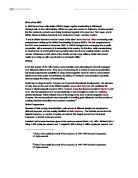Unlike the press the BBC is formally obliged to remain impartial. To maintain a degree of independence from the state of the governing administration was to appoint a committee of 12 public figures on a five yearly basis who would, in turn, appoint a director general. The extent to which these committees were composed of ‘political appointees’ who could steer the BBC in directions favourable to the government has been a subject of controversy . So has the BBC’s real ‘independence’ in light of the government’s power to set licence fees and therefore apply financial pressure in the event of unfavourable or controversial political coverage. Under its first director John Reith the BBC was given a mission to bring the ‘Best’ of British culture to the nation, to enlighten, elevate and ‘educate’ wherever possible.
The BBC is formally obliged to remain politically impartial especially in times of political conflict.
The governors role is to ensure that the BBC fulfils its obligations as laid down by the law by remaining an impartial and politically correct organisation.
The BBC is set up by the Royal Charter therefore programmes on war, Remembrance services, Queen’s speeches are broadcast to remain as a high well respected organisation. In contrast to channel 4, the BBC is less cutting edge, the BBC broadcasts programmes that are usually v. The BBC abides by the rule of remaining impartial, channel 4 broadcasts programmes that would not be shown on the BBC as many programmes do no remain politically lawful, for example, the conspiracies of 9/11 was broadcasting on channel 4, it was as insight into what the programme makers believed to have happened therefore the BBC didn’t broadcast this biased programme that criticized the American and British Public.
As the generations have progressed the BBC targets and attracts a wider audience with the aid of many subsidiaries enabling wider target audiences therefore increasing the popularity and remaining at a high status broadcasting co-operation.
The BBC encourages a wider audience by introducing subsidiaries Cbeebies for younger children, News 24, CBBC, BBC3, BB4, they have also introduced print as a subsidiary. The advantages of having many subsidiaries are that they reach audiences in very different unique ways. People who may not have time to watch the news on television or blind people will chose to listen to the radio instead. The channel Cbeebies proved to have a significant impact on children all around the world, the broadcasting of the ‘teletubies’ proved extremely popular it was sold to over 75 countries and was translated into 45 languages, this evidently showed the BBC’s positive impact world wide.
A platform is the means of delievering media through television, terrestrial which are channels such as the BBC, ITV, Channel 4
Other platforms are pay per view, internet, Broadband and the use of mobiles.
The advantage to television being a platform is that there is a lot of variety on television including satellite as well as terrestrial, its an effective way of advertising and informing. There are many varieties of channels enabling a wider audience to view the BBC for information as well as to educate them.
Mobiles are another form of transporting media, new technology. Using the mobile is quick and easy therefore accessing to media will be quick and easy.
The internet is a fast, quick and easy way of accessing to the media. The internet can be used anywhere, home, school, work etc.
Horizontal and vertical media
In all industries there is a tendency for the bigger, more successful companies to take over smaller companies in a search for greater growth. When the take over involves a direct competitor in the same sector then the process is referred to as a horizontal integration, this is the aim of any large co-operation, for example if a newspaper/BBC print, magazine publisher buying out a rival publisher.
Vertical integration is when a company takes over another company which is responsible for other stages of the production cycle, for example a newspaper company buying out a newsagents chain or a paper manufacturer.
Such process of integration are occurring almost daily in the media, as can be detected by a quick survey of the industry’s trade magazines.
Mainstream media production is characterized by a growing concentration of ownership. In all the media industries, a few large companies control a sizeable share of the market. When these companies own shares in several media sectors and on an international scale, they’re referred to as multimedia conglomerates.
The BBC organisation is very traditional and is well established. Its genre is very much the ‘British Culture’ to attract and target the British audience as well as successfully targeting the different genders and cultres.
Being politically impartial and respecting the government and being very patriotic will connote a very British feel.
The BBC is easily available around the world by the successful use of platforms, internet, etc.
The BBC is well established and is well respected within the media.
Twelve governors ensure the BBC is run in the interest of the viewers and listeners.
- They act as trustees of the public interest and ensure that it fulfils its obligations.
- They’re appointed by the Queen on the advice of the government ministers.
- Day to day operations are run by sixteen divisions. Their directors report to the director general, forming the executive Board.
- It answers to the Board of Governors.
Each divisions performance is regualarly assessed by the BBC’s Governors, an advantage to the assessment is that, problems can be learnt from therefore creating a better chance of gaining a larger target audience.







